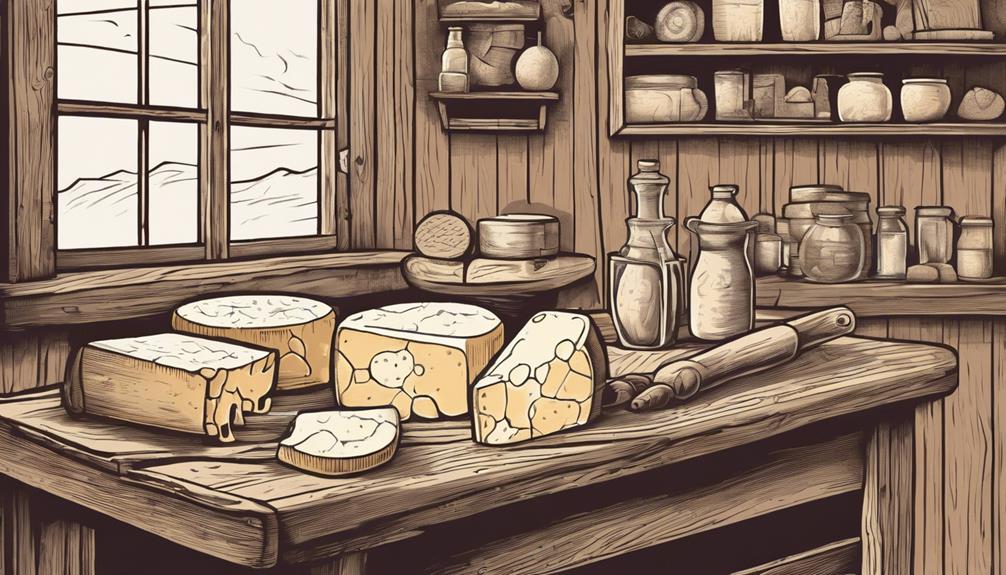How To Become More Self-Sufficient Without Starting a Full-Blown Farm…
Want to start preserving your harvest, making your own soap, or building a backyard root cellar — but not sure where to begin? “Homesteading Advice” gives you instant lifetime access to 35+ practical homesteading books on food preservation, veggie gardening, DIY natural cleaning products (save over $250 per year with this skill alone), brewing, off-grid energy, and a whole lot more…
Click Here To Check It Out Now!
“I’ve been making cheese in my small home lab in Hereford, UK for a while now, but recently I’ve noticed that my cheeses aren’t aging properly. They either get too hard, develop off flavors, or sometimes don’t develop their rind correctly. I follow all the usual steps, so I’m not sure what’s going wrong!” Thanks, Diane, Hereford, UK.
Why Did My Cheese Not Age Properly?
Hey Diane, I’m thrilled you reached out with your cheese-aging conundrum! It sounds like you’ve put so much heart into your craft. Let’s unravel the mystery behind why your cheeses may not be aging as they should. Here are some angles to consider:
Quality of Milk
The foundation of any cheese lies in the quality of the milk used. If the milk isn’t up to par, the aging process can be adversely affected. Here’s what to check:
- Source of Milk: Ensure you’re using fresh, high-quality milk. Raw milk tends to be richer in natural bacteria that help during the aging process. However, if you’re using pasteurized milk, make sure it hasn’t been ultra-pasteurized, as it could hamper your cheese’s development.
- Fat Content: The fat content in the milk can significantly affect the texture and flavor of your cheese. Whole milk usually works best for aging cheeses.
Starter Cultures and Rennet
These ingredients are crucial in shaping the flavor, texture, and overall development of your cheese during aging.
- Starter Cultures: Ensure they’re fresh and stored correctly. Old or improperly stored cultures can lose potency.
- Rennet: The type and amount of rennet can impact how well the curds form and ultimately affect the aging process. Liquid rennet is often easier to work with and measure accurately.
Rind Development
The rind acts as a protective barrier, allowing the cheese to mature internally while developing its unique flavor profile.
- Humidity Levels: Ideally, the aging room should maintain a humidity level of around 80-85%. Too low, and your cheese will dry out; too high, and you risk mold issues.
- Temperature: Aim for consistent temperatures between 50-55°F. Fluctuations can lead to inconsistent rind development.
Environmental Factors
The microenvironment you create for your cheese plays a significant role in how well it ages.
- Aging Space: Your aging room or container should have proper air circulation, humidity control, and cleanliness to prevent unwanted microbial growth.
- Regular Monitoring: Check your cheese weekly for any signs of spoilage, unusual mold growth, or off smells. Rotate and flip your cheese to ensure even aging.
Mold and Bacterial Cultures
Molds and bacteria responsible for developing certain flavors and textures need to be carefully managed.
- Blue and White Molds: If your cheese isn’t developing the right molds, it could be due to improper inoculation or environmental imbalances.
- Washing the Rind: Some cheeses require periodic washing with brine or alcohol to encourage the growth of desirable bacteria and molds.
Timing and Patience
Aging cheese is an art that requires timing and patience. Each cheese variety has its specific aging duration, and any deviation might affect the final product.
- Type of Cheese: Hard cheeses like Cheddar require months to develop their flavor, while soft cheeses like Camembert may only need a few weeks.
- Personal Observation: Trust your senses. Taste, touch, and smell your cheese periodically to learn how it evolves over time.
Pests and Contaminants
Keep an eye out for pests and contaminants that could derail your cheese aging process.
- Insects: Make sure your aging area is free from insects that could spoil your cheese.
- Sanitation: Regularly clean the space and tools used in cheese making to avoid cross-contamination.
Common Problems and Solutions
Here are some common issues cheesemakers face during the aging process and how to tackle them:
- Too Dry: If your cheese is drying out, try increasing the humidity or wrapping the cheese in wax or special cheese paper.
- Bitter Flavor: This can be due to over-renneting or problematic bacterial growth. Adjust the rennet amount and ensure the right cultures are used.
- Off-Flavors: Often caused by contamination. Keep everything as clean as possible and use fresh ingredients.
Emotional and Psychological Aspect
Believe it or not, our mindset can influence our cheesemaking. Patience and attention to detail are crucial.
- Stay Calm: If things go awry, don’t be disheartened. Cheesemaking is as much an art as it is a science.
- Document Everything: Keeping detailed notes will help you replicate successes and learn from mistakes.
Final Thoughts…
Diane, thank you for sending in your question. Aging cheese can be a complex yet rewarding journey. Remember, even seasoned cheesemakers encounter hiccups along the way. Focus on the key areas mentioned—milk quality, environmental factors, and careful monitoring—and you’ll start seeing better results. Keep experimenting and noting your observations. Happy cheesemaking!

